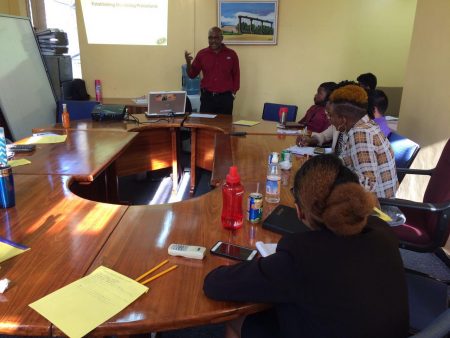The Government Analyst Food and Drug Department (GA-FDD) on Monday commenced a workshop to sensitise stakeholders in the agro-processing industry on the United States Food and Drug Administration (FDA) Food Safety Modernization Act (FSMA)
Signed into law by former US President Barack Obama on January 4, 2011, the FSMA aims to ensure the US food supply is safe by shifting the focus from responding to contamination to preventing it. As a result, Caribbean suppliers to the US market who fail to meet the requirements of the law can cause the rejection of goods from the region, including Guyana.
It is against this background that GA-FDD Director Marlan Cole hosted the workshop to prepare and sensitize local manufacturers. “We took the initiative to ensure that trade between Guyana and the US, where food in those niche markets are concerned continue unabated,” Cole said, while also noting that the GA-FDD’s laboratory must be capable of lending support to the industry and the department’s inspectorate.

Visiting from Jamaica, Dr. Andre Gordon, Managing Director of Technological Solutions Ltd. (TSL), told Stabroek News that one of the important things that any country can do is to make sure that the system in place for its food industry stays relevant with what is happening in the rest of the world.
Commenting on the efforts being made to have the GA-FDD’s laboratory internationally-accredited, Gordon noted that it is this very unit that is tasked with supporting and enforcing regulatory practices for the local food industry.
It is with this in mind that the GA-FDD realized that it needed to upgrade its operations, have its lab operate at a level that is internationally-recognized and have its staff be equipped with the knowledge and operate in a manner that would be accepted internationally.
“What we are trying to do right now is raise the knowledge base and help them get their lab accredited, inspectors and inspectorate accredited by international standards and also help them train local manufactures and producers in the requirements that would allow them to expand and move forward in the exportation industry,” Gordon noted.
Additionally, efforts are also underway to have inspectors familiarize themselves with changes in all regulations and what they need to do in order to comply, thus allowing them to inspect against both local and international standards.
According to Gordon, this would also help protect consumers from the substandard products that may enter the country, which is one of the things for which inspectors are responsible.
“Once the inspectors know what the requirements are elsewhere, then you are in a position to say to your importers or those who are exporting to you, meet these requirements or they won’t be accepted,” he added.
Another aspect of this programme would be for the GA-FDD to ensure that local manufacturers who export to the US and other countries are able to meet the required standards to avoid putting trade between Guyana and other countries at risk. “Food exports are what help to create a lot of employment for the farmers and producers, so if the exports are put at risk, it is going to create significant implications for the economy and the livelihoods of those involved,” Gordon said.
Additionally, it is Gordon’s belief that the implementation of these requirements help in the elevation of local manufacturing standards.
“A lot of people in the seafood industry, shipping pepper and so on export without applying and are getting into the market without a problem now… before September comes. Rejections will hurt more and cost more… many manufacturers don’t know that the owners or the managers of businesses in this industry are legally liable for any product that is entered into commerce in the US that is unsafe,” he explained.
“As of September 18, when these regulations kick in, the owner of business whether or not they are a part of the day to day operations, are liable if those products go into the market and they are found to be unsafe. And in assessing what happens, the US, once determining that the appropriate steps to ensure that those products were not shipped were not taken, then they are liable,” Gordon added, while saying those found culpable could face fines and also imprisonment.
“Now I’m not saying that this is going to happen but people need to understand that, legally, this is possible,” he explained.
A key measure to address this as stipulated by the FSMA is the presence of a Preventive Controls Qualified Individual (PCQI), who under the new regulations is required by US law to ensure that no product is shipped from a facility that is not safe or does not meet all their requirements.
Efforts are afoot to have this programme rolled out in the very near future for the benefit of all those in the industry.
“The GA-FDD has recognized the need to help the industry comply and at the same time to ensure their inspectors and their lab staff are trained to help the industry while they make that transition as well as to see their lab staff certified and accredited internationally so that when they have to do any tests, others will accept the results without having to query,” Gordon added.
This, he said, would be a very big accomplishment for the country, since as far as he is aware there are no other inspectorates in Caricom with internationally-accredited inspectors. This is expected to be accomplished in the next six months or so, while the accreditation of the GA-FDD’s lab is expected to be done before the end of the year.
“That would make the GA-FDD’s lab one of two or three others who would be internationally-accredited… it’s a major accomplishment,” Gordon added.
In terms of response, Gordon said those who attended the workshop were anxious to know how the can get on board since many of them claim they were unaware of the regulations and would appreciate the assistance.





